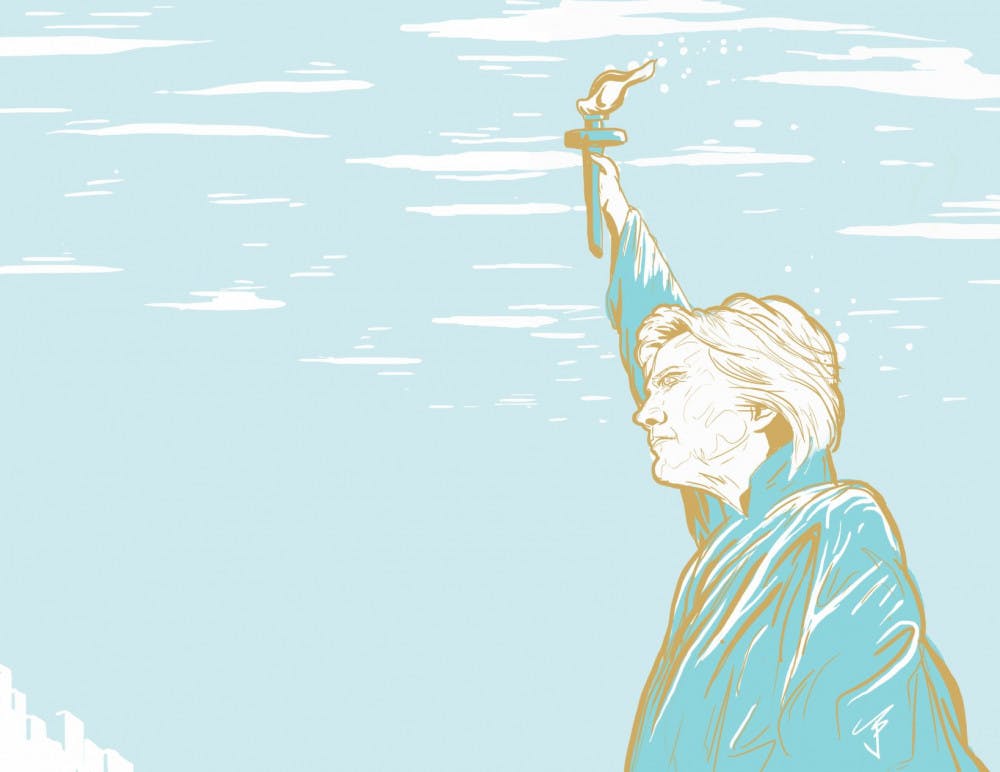On Nov. 8, 2016 various election polls were indicating that former secretary of state Hillary Clinton had a narrow but sustained lead over then-Republican-nominee Donald Trump for the 2016 presidential bid.
Leading up to the election, publications all the way from The New Yorker to The Daily Helmsman prepared potential front covers that illustrated Clinton’s nearly-expected-victory. On election night changes in these newsrooms were made once results were close enough to call: Donald Trump had won 264 projected electoral college votes at The Helmsman’s press time, while Clinton had mustered 215. The final count saw Trump with 306 and Clinton with 232.
Before the election, The New York Times pegged Clinton’s chances at 58 percent and Trump at 42 percent in early June. By July 11 Clinton was projected to win with 77 percent, and by Aug. 26 her victory was projected at 90 percent. On election day the Times polled her chances at 85 percent.
Most polls tracked by RealClearPolitics.com from Sept. 8 to Nov. 8 also projected Clinton to be victorious — except one from Fox and nine from USC Dornsife / LA Times. The LA Times credited their online polling system for reflecting voters’ intentions better than phone calls could.
Since Nov. 9 2016, the United States has known businessman and former-reality-TV-personality Donald Trump as its president. Though a general sense of polarization might seem to be more evident since last year’s election, Eric Groenendyk, associate professor of political science at the University of Memphis, said the American people would still be very polarized if Donald Trump had not won the election one year ago.
“Trump may well have accelerated polarization, and trends in opinion data do seem to support this, but the trend started long before Trump,†Groenendyk said. “Therefore, we would undoubtedly also be very polarized if Clinton had won the election.â€

Publications like The Daily Helmsman and The New Yorker prepared potential front covers illustrating Hillary Clinton as the victor of the 2016 election after election polls predicted Clinton’s chances to win upwards of 80 percent.
Still, Groenendyk said it would be pertinent to ask whether the country has become divided over things that were not “particularly divisive issues†before Trump’s election.Â
“There have been growing divisions between partisans’ feelings toward the opposing party and partisans’ feelings about certain political issues for a long time,†he said. “Since Trump, these divisions have started to spread into Americans’ faith in the elections, media, the justice system, etc.â€Â
The political psychologist said he believes this is troubling because he said these are “the foundations of democracy.â€Â Â

Donald Trump’s presidency has particularly changed the role of social media, according to Joseph Hayden, a journalism professor at the U of M and an expert in media and politics. Most politicians do not use social media as much as the current president does, according to Hayden. When they do, aids and assistants tend to handle these platforms.
“If someone were really concerned about their image or the way the White House and his administration was being perceived, he would not be tweeting at three in the morning from the toilet,†Hayden said. “Surely even he must be tired of all the 24/7 media activity he’s engaged in.â€
Hayden said he believes a Hillary Clinton presidency would differ from a Trump presidency as it would “no doubt be less exciting and less eventful.â€
“Hillary Clinton is just a more traditional politician,†Hayden said. “She doesn’t want to be in the media every day in headlines. The stories wouldn’t be nearly as fun, and we wouldn’t have a scandal a day.â€
Though new potential scandals are brought to Americans’ attention on a regular basis, Groenendyk said as the country has become more polarized, people have become more engaged with politics on “a variety of dimensions.â€
“Politics is a lot like sports,†he said. “We are all aware that our voice (and vote) is just one amongst many millions, so it is highly unlikely to change the outcome of any given election. Still, we participate, because we enjoy cheering along with the other fans of our side … We do the same thing when we go to support the Tigers or Grizzlies. When our team wins in sports or in politics, it feels like a win for us as well.â€






